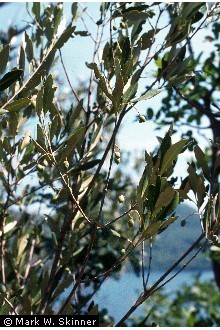Goodbye, Olive Oil
June 8, 2017
by William P. Meyers
Also sponsored by Earth Pendant at PeacefulJewelry
Popular pages:
| U.S. War Against Asia |
| Fascism |
| Democratic Party |
| Republican Party |
| Natural Liberation |
Environmentalists Contribute to Spreading a Plague
Ancient trees threatened with being cut down. Environmentalists protesting, lobbying the government, even tying themselves to trees to prevent them from being cut down.
What is there for an old Earth First! hand like me not to like?
Plenty. The trees were ancient olive trees in southern Italy. They were infected with a pathogen, Xylella fatidiosa. And now all the olive trees of Italy are at risk because the plague has spread beyond the historic olive groves of Puglia (Apulia).
 Olive tree. Source: USDA
Olive tree. Source: USDA
The tree-huggers chained themselves to ancient olive trees in the Italian town of Oria, "to prevent them from being uprooted. They won a Pyrrhic victory: trees all around the area are now dying and Xylella has been declared endemic there." [Italy rebuked for failure to prevent olive-tree tragedy, in Nature, June 7, 2017]
But it is mainly the Italian government that has failed to stop the spread of the disease. Xylella bacteria of various strains can cause olive quick decline syndrome (OQDS). Scientists first spotted the disease in 2013, but the government failed to destroy infected trees, which is the only known method of stopping the disease. It even stopped monitoring for the disease in 2016.
It is looking bad for olive trees in Europe now that the disease has been spotted at multiple points in southern Italy. Other subtypes of Xylella have not been spotted in France, Germany, and Switzerland. So far in Spain, a major olive producer, it has only been found in the Balearic Islands, but it just takes one person or insect moving about to spread the disease.
So, no olive oil? No pimento-stuffed green olives? A bit early to panic, as it may take years for trees to become infected and die. Good hygiene should protect at least some of the groves.
Some types of olive trees are more resistant than others to various strains of Xylella. Some resistant varieties are already being tested for replanting destroyed groves. But olive trees grow very slowly. It will take time to restore production, if indeed the impact is severe. We are all watching evolution at work, not the evolution of new species, but the evolution of immunity to disease within a species.
Most environmentalists favor science, but even scientists sometimes mistake pseudoscience for real science. Environmentalists can become passionate, which is a good thing. But passion can backfire on us when we get our facts and science wrong. We all need to step back from our emotions from time to time and think if we are acting in a manner that really furthers our goal of a sustainable earth.
